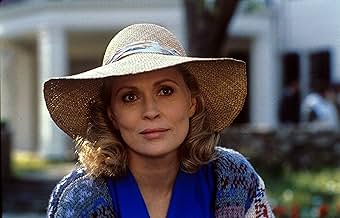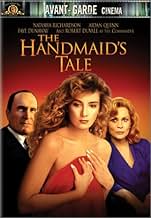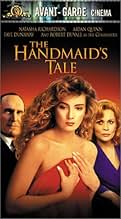In una tirannia religiosa distopica, una giovane donna viene messa in schiavitù sessuale a causa della sua rara fertilità.In una tirannia religiosa distopica, una giovane donna viene messa in schiavitù sessuale a causa della sua rara fertilità.In una tirannia religiosa distopica, una giovane donna viene messa in schiavitù sessuale a causa della sua rara fertilità.
- Regia
- Sceneggiatura
- Star
- Premi
- 2 vittorie e 1 candidatura in totale
Reiner Schöne
- Luke
- (as Rainer Schoene)
Robert D. Raiford
- Dick
- (as Robert Raiford)
Recensioni in evidenza
An unfortunate movie which is definitely more like Harold Pinter's earlier plays than anything Margaret Atwood ever produced. No attempt is made to bring out Atwood's clever social message, and we're all supposed to be shocked at the sexual content. A shame, because Atwood's version might have made a good film.
Margaret Atwood, a Canadian novelist (and poet) wrote the dark fantasy novel on which this film is based. It is set in The Republic of Gilead, formerly the United States, or at least the parts of it that are not radioactive. The radioactive parts are called the colonies, where bad girls are sent to die of radiation poisoning. The time is the near future, after the inevitable nuclear war, and the breakdown of government as we know it.
The society depicted in The Handmaid's Tale is a nightmare: everyone is watched by the Eyes, unknowable, unseen government spies. Women are forbidden to have jobs. They are irrevocably assigned to classes. At the top are the chaste, but morally superior, Wives, almost all of whom have been rendered infertile by the inevitable unclear war. At the bottom are the housekeepers, or Marthas, who are non-entities. In the middle are the Handmaids of the title, who are fertile, but tightly controlled. The term Handmaid is a Biblical term that is used in the Old Testament stories of Abraham, Sarah, Jacob and Rachel. In the Bible, the wives gave their handmaids to their husbands in order to produce heirs.
Handmaids, in the film and the book, are forced to have sex with the Commanders, the husbands of the Wives. During this sex, the Wives are intimately present to take in any "love" their Commanders have to give.
The Handmaids are trained to remain unattached to the Commanders. They are prohibited from using makeup or doing anything to make themselves attractive. Handmaids are forced to turn their offspring over to the morally "fit" Wives.
Robert Duvall, a Commander in whose home Offred is placed, gives a family Bible reading performance that will curdle the blood of true people of faith. It is a breathtaking, heart-stopping performance.
The government is totalitarian and monotheistic. The one god is very strict, and has His Eyes everywhere.
Offred, who was once known as Kate, is a Handmaid who, despite her training (read brainwashing), recalls her past, her loving husband, and her adored daughter. She tells with sparkling, and terrifying clarity, how the society came to be the way it is.
This governmental aspect of the story is instructive, however, they are almost totally absent in the film.
Offred's/Kate's personal story is heartrending. It reminds one of the miseries of, say, the women of Darfur. When the government breaks down, she and her husband and daughter attempt to flee to Canada. Unfortunately, they are caught. Her daughter is "confiscated." Her husband is taken away. She never sees her husband again.
Offred's training is not as extensively portrayed in the film as it is in the book, but her feeling of terror and helplessness are palpable, in an exquisite performance by Natasha Richardson. Warning, blood is shown.
As we ride down the slippery slope toward the overturning of Roe v. Wade, this film is a must see for those who still care about women's rights.
The society depicted in The Handmaid's Tale is a nightmare: everyone is watched by the Eyes, unknowable, unseen government spies. Women are forbidden to have jobs. They are irrevocably assigned to classes. At the top are the chaste, but morally superior, Wives, almost all of whom have been rendered infertile by the inevitable unclear war. At the bottom are the housekeepers, or Marthas, who are non-entities. In the middle are the Handmaids of the title, who are fertile, but tightly controlled. The term Handmaid is a Biblical term that is used in the Old Testament stories of Abraham, Sarah, Jacob and Rachel. In the Bible, the wives gave their handmaids to their husbands in order to produce heirs.
Handmaids, in the film and the book, are forced to have sex with the Commanders, the husbands of the Wives. During this sex, the Wives are intimately present to take in any "love" their Commanders have to give.
The Handmaids are trained to remain unattached to the Commanders. They are prohibited from using makeup or doing anything to make themselves attractive. Handmaids are forced to turn their offspring over to the morally "fit" Wives.
Robert Duvall, a Commander in whose home Offred is placed, gives a family Bible reading performance that will curdle the blood of true people of faith. It is a breathtaking, heart-stopping performance.
The government is totalitarian and monotheistic. The one god is very strict, and has His Eyes everywhere.
Offred, who was once known as Kate, is a Handmaid who, despite her training (read brainwashing), recalls her past, her loving husband, and her adored daughter. She tells with sparkling, and terrifying clarity, how the society came to be the way it is.
This governmental aspect of the story is instructive, however, they are almost totally absent in the film.
Offred's/Kate's personal story is heartrending. It reminds one of the miseries of, say, the women of Darfur. When the government breaks down, she and her husband and daughter attempt to flee to Canada. Unfortunately, they are caught. Her daughter is "confiscated." Her husband is taken away. She never sees her husband again.
Offred's training is not as extensively portrayed in the film as it is in the book, but her feeling of terror and helplessness are palpable, in an exquisite performance by Natasha Richardson. Warning, blood is shown.
As we ride down the slippery slope toward the overturning of Roe v. Wade, this film is a must see for those who still care about women's rights.
I have just one point to make about this film, and that is why on earth did the director decided to name Offred kate. In the book, which I hope to god the producers etc actually read, there is no mention of the name kate what so ever, the only name that we could possibly guess would be June which is supplied to us in the first chapter but even then we never learn her real name. And this is of great significant importance, the fact that we as readers or viewers never learn her name means something and to simply choose a name out of a hat is destroying a piece of the character created for us by Margaret Attwood. Also reading the plot outline makes me wonder whether whoever wrote that even saw the film, especially where it says "Kate is a criminal, guilty of the crime of trying to escape from the US, and is sentenced to become a Handmaid." when really "KATE" becomes a handmaid as her husband was married once before and their marriage never really existed in the eyes of the law. Also i read on to see that "After ruthless group training by Serena Joy in the proper way to behave, Kate is assigned as Handmaid to the Commander." Well that is not at all true as anyone who has seen this film will notice that Serena Joy is the commanders wife and not one of the Aunts and the Red Centre. Please in the future get your facts right and also thanks to director Volker Schlöndorff for ruining a perfectly enjoyable book. My advice stick to the book and not the watered down version for the small minded.
I finally watched this after watching the TV show and if anything, it shows that some books should not be adapted unless there is enough time to tell the story.
The film tries to feature the key moments that the TV show had time to bring up, and 90 minutes (or so) simply isn't enough.
The casting is flawed on several characters, like many reviewers point at, and the script feels rushed, which of course creates the feeling that the story progresses without any logic.
Nonetheless you will find some scenes are really good, and in fact, those same scenes found their way into the TV show.
The atmosphere of the book is well conveyed, I just wish they had had more time, which the largely superior TV show had.
Watch this for reference after reading the book, after watching the show : great books can make awesome TV shows but poor films sometimes.
The film tries to feature the key moments that the TV show had time to bring up, and 90 minutes (or so) simply isn't enough.
The casting is flawed on several characters, like many reviewers point at, and the script feels rushed, which of course creates the feeling that the story progresses without any logic.
Nonetheless you will find some scenes are really good, and in fact, those same scenes found their way into the TV show.
The atmosphere of the book is well conveyed, I just wish they had had more time, which the largely superior TV show had.
Watch this for reference after reading the book, after watching the show : great books can make awesome TV shows but poor films sometimes.
This movie, based on Margaret Atwood's story, concerns a woman living in the not too distant future in the Republic of Gilead, a country that was once the United States. The country is now run by fundamentalist Christians who have demoted all women to a second class citizenship. Nuclear war has made most women infertile, so the government has forced all the fertile women to serve as handmaids and bear children for the leaders and their infertile wives as part of a biblical prophecy. The infertile women are sent off to toil as slaves and clean up nuclear waste. This movie concerns one handmaid, Offred (Kate) and her struggle to escape Gilead, find her daughter, and flee to Canada. Not a bad movie at all, all the actors do very well. The material just runs very slow at points, and the character's aren't all that well developed.
Lo sapevi?
- QuizWhile working on the film, Robert Duvall became so fascinated with evangelism that it inspired him to write L'apostolo (1997).
- BlooperWhen Moira ties up Aunt Lydia and escapes the Red Center, it is late at night, but moments later, when she exits, it is clearly daytime.
- Colonne sonoreWhispering Hope
Written by Septimus Winner as Alice Hawthorne
I più visti
Accedi per valutare e creare un elenco di titoli salvati per ottenere consigli personalizzati
- How long is The Handmaid's Tale?Powered by Alexa
Dettagli
- Data di uscita
- Paesi di origine
- Sito ufficiale
- Lingua
- Celebre anche come
- El cuento de la doncella
- Luoghi delle riprese
- James Adams Buchanan House, 1810 Cedar St, Durham, Carolina del Nord, Stati Uniti(Commander Fred's house)
- Aziende produttrici
- Vedi altri crediti dell’azienda su IMDbPro
Botteghino
- Lordo Stati Uniti e Canada
- 4.960.385 USD
- Fine settimana di apertura Stati Uniti e Canada
- 738.578 USD
- 11 mar 1990
- Lordo in tutto il mondo
- 4.960.385 USD
- Tempo di esecuzione
- 1h 49min(109 min)
- Colore
- Mix di suoni
- Proporzioni
- 1.85 : 1
Contribuisci a questa pagina
Suggerisci una modifica o aggiungi i contenuti mancanti























